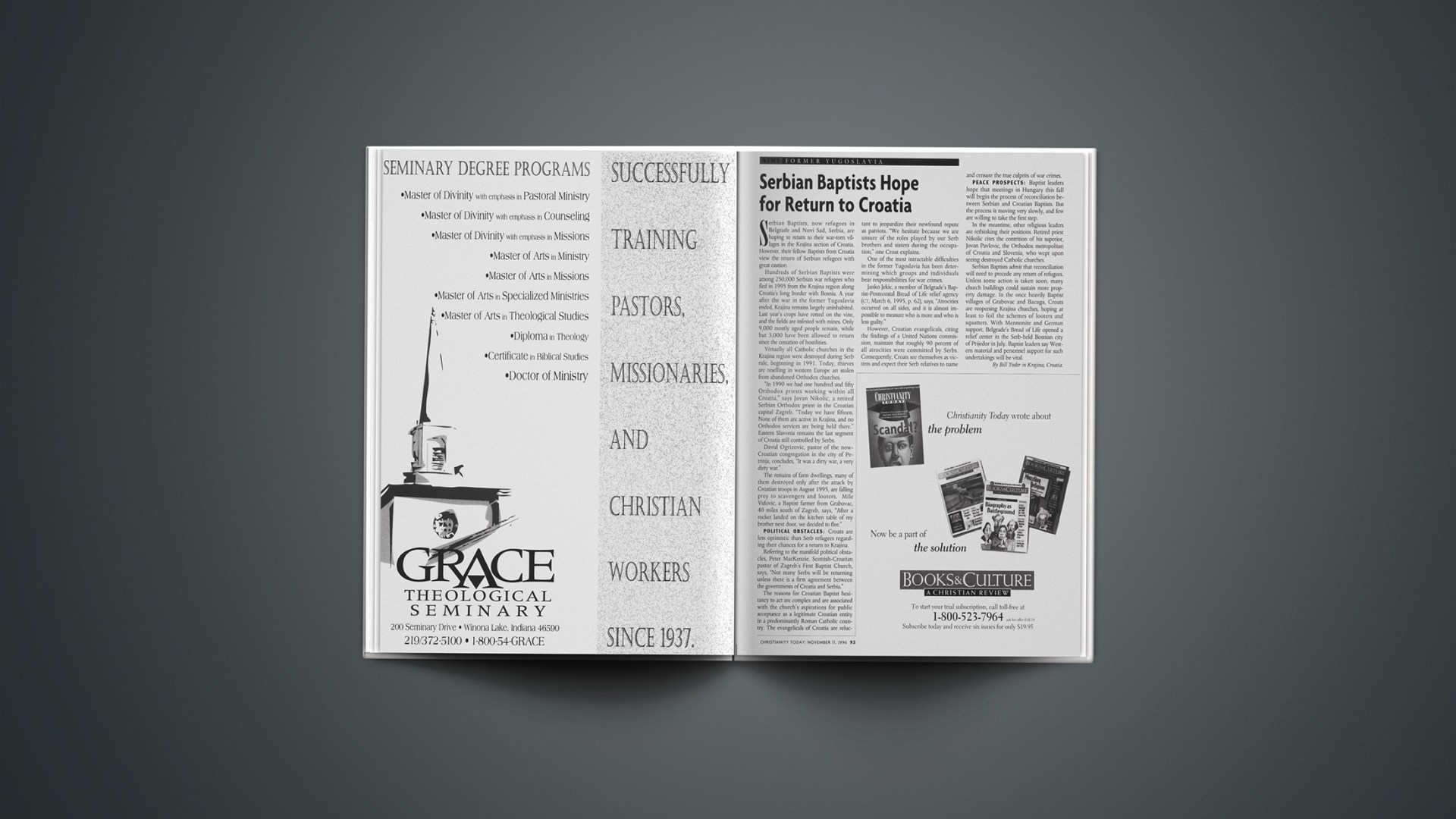Serbian Baptists, now refugees in Belgrade and Novi Sad, Serbia, are hoping to return to their war-torn villages in the Krajina section of Croatia. However, their fellow Baptists from Croatia view the return of Serbian refugees with great caution.
Hundreds of Serbian Baptists were among 250,000 Serbian war refugees who fled in 1995 from the Krajina region along Croatia’s long border with Bosnia. A year after the war in the former Yugoslavia ended, Krajina remains largely uninhabited. Last year’s crops have rotted on the vine, and the fields are infested with mines. Only 9,000 mostly aged people remain, while but 3,000 have been allowed to return since the cessation of hostilities.
Virtually all Catholic churches in the Krajina region were destroyed during Serb rule, beginning in 1991. Today, thieves are reselling in western Europe art stolen from abandoned Orthodox churches.
“In 1990 we had one hundred and fifty Orthodox priests working within all Croatia,” says Jovan Nikolic, a retired Serbian Orthodox priest in the Croatian capital Zagreb. “Today we have fifteen. None of them are active in Krajina, and no Orthodox services are being held there.” Eastern Slavonia remains the last segment of Croatia still controlled by Serbs.
David Ogrizovic, pastor of the now-Croatian congregation in the city of Petrinja, concludes, “It was a dirty war, a very dirty war.”
The remains of farm dwellings, many of them destroyed only after the attack by Croatian troops in August 1995, are falling prey to scavengers and looters. Mile Vidovic, a Baptist farmer from Grabovac, 40 miles south of Zagreb, says, “After a rocket landed on the kitchen table of my brother next door, we decided to flee.”
POLITICAL OBSTACLES: Croats are less optimistic than Serb refugees regarding their chances for a return to Krajina.
Referring to the manifold political obstacles, Peter MacKenzie, Scottish-Croatian pastor of Zagreb’s First Baptist Church, says, “Not many Serbs will be returning unless there is a firm agreement between the governments of Croatia and Serbia.”
The reasons for Croatian Baptist hesitancy to act are complex and are associated with the church’s aspirations for public acceptance as a legitimate Croatian entity in a predominantly Roman Catholic country. The evangelicals of Croatia are reluctant to jeopardize their newfound repute as patriots. “We hesitate because we are unsure of the roles played by our Serb brothers and sisters during the occupation,” one Croat explains.
One of the most intractable difficulties in the former Yugoslavia has been determining which groups and individuals bear responsibilities for war crimes.
Janko Jek? a member of Belgrade’s Baptist-Pentecostal Bread of Life relief agency (CT, March 6, 1995, p. 62), says, “Atrocities occurred on all sides, and it is almost impossible to measure who is more and who is less guilty.”
However, Croatian evangelicals, citing the findings of a United Nations commission, maintain that roughly 90 percent of all atrocities were committed by Serbs. Consequently, Croats see themselves as victims and expect their Serb relatives to name and censure the true culprits of war crimes.
PEACE PROSPECTS: Baptist leaders hope that meetings in Hungary this fall will begin the process of reconciliation between Serbian and Croatian Baptists. But the process is moving very slowly, and few are willing to take the first step.
In the meantime, other religious leaders are rethinking their positions. Retired priest Nikolic cites the contrition of his superior, Jovan Pavlovic, the Orthodox metropolitan of Croatia and Slovenia, who wept upon seeing destroyed Catholic churches.
Serbian Baptists admit that reconciliation will need to precede any return of refugees. Unless some action is taken soon, many church buildings could sustain more property damage. In the once heavily Baptist villages of Grabovac and Bacuga, Croats are reopening Krajina churches, hoping at least to foil the schemes of looters and squatters. With Mennonite and German support, Belgrade’s Bread of Life opened a relief center in the Serb-held Bosnian city of Prijedor in July. Baptist leaders say Western material and personnel support for such undertakings will be vital.
Copyright © 1996 Christianity Today. Click for reprint information.










